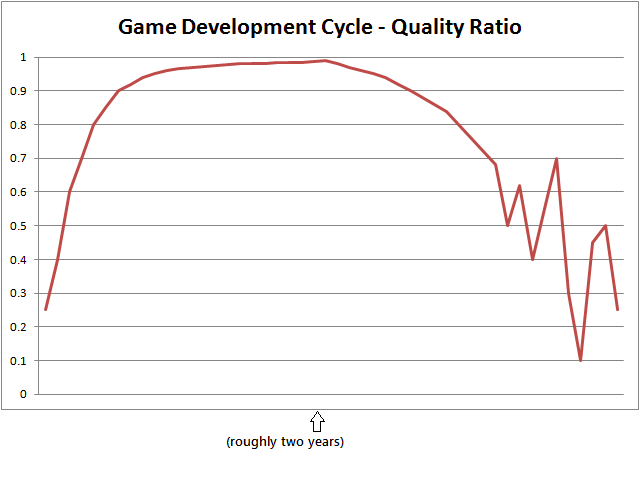Video games are difficult and time consuming to make. Every year, we hear of Hollywood films costing hundreds of millions of dollars, and we see credits at the end with thousands of names. Games are more complicated than that: they often require all the narrative, audio and visual prowess that films do today, and also require programming expertise on making these worlds interactive, further adding to the complexity.
But how long does it take to make a game?
“Duke Nukem Forever” reportedly took 15 years of development time. And yet, we see several games from large publishers (“Call of Duty,” “Assassin’s Creed”) get made in under a year. What’s the difference?
I wrote a post just yesterday about “The Great Penny Robbery,” a game demo I made that you can play right now. It took me one week to make. It isn’t nearly complete: animations are crude or missing, the environment and physics could use some tweaking. As it stands, it is a terrible game. But it is playable. It is visually there. And it took me ONE WEEK TO COMPLETE. For that, I am quite proud. Even better, game jams are hosted every year that usually require developers to make a game from scratch in as little as 48 hours. And most of the games made in these jam sessions are actually good! Some of them continue on to be successful, full-sized indie games on their own!
So how long does it take to make a game? Consider the chart below:
This graph may not be scientifically accurate, but I think the it shows how I feel about time spent on a single project. If 1.0 (100%) is the goal quality for your game, working indefinitely won’t consistently get you closer to it. In fact, taking too long on one project can ruin your senses and blur your opinions as you work on it. It can mean the project doesn’t have enough focus. It can mean there is too much wrong with it that you are still trying to fix. “Duke Nukem Forever” is known to be a terrible game, despite all the time that went into it. In the worse cases, you might end up in the red and not finish the game at all.
Another point I want to make is that you don’t need to work for perfection either. It sounds strange, but hear me out. Artists always want to spend more time on their art. Sometimes this works out for the better, but often the art piece would be finished long before the artists stops, and the majority of new time spent results in subtle changes that add little to the final presentation. This is true of games as well. When you get to the implementation of the game, it should be mostly finished within the first few months. More time might be spent tweaking the art, the animations, the music and sound effects, the environment layout, but the majority of the game should be done. And all that extra tweaking might take months or years to complete when it only raises the quality of the game from an 7.0 to an 8.0.
I haven’t even begun to talk about pre-production. The majority of games that require a lot of time to make spend most of that time just figuring out what they are doing in the first place. Actually making the game is relatively quick. But would you want to spend years on a game with nothing to show but some notes on paper? Don’t dwell too long on it, think about ideas in the back of your head as you go about other business. Let it grow on it’s own, don’t waste time forcing it out: that’s how the best ideas begin.
Of course, if you can afford the time and effort, you should always try to make your games to the best of your ability. But give yourself a limit, set a deadline to aim for. That ideal time limit is a mystery, and no one wants to spend their whole lives on one game only to find that they’ve passed that unknown point years ago, only to have a final product that falls much shorter than you intended.


